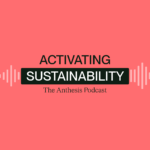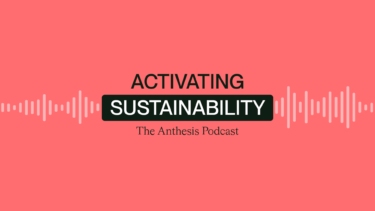
Speakers
Chris Peterson – Director
Dr Richard Peagam – Chief Digital Officer
Marc Peeters
Chris Shaw – Technical Director
Related Topics
Share this episode
In this episode of our Activating Sustainability series, our host Chris Peterson is joined by Chief Digital Officer Dr Richard Peagam, Marc Peters and Technical Director Chris Shaw to discuss current trends and challenges in the regulatory space, and how digital solutions are playing a key role in meeting mandatory reporting requirements.

Read the transcript
Chris Peterson: Hello and welcome to activating sustainability. The Anthesis podcast. I’m your host, Chris Peterson. all of us in the sustainability space and beyond, we’re experiencing a fundamental shift in mandatory and regulatory reporting expectations, practices, and tools. To help us understand and explore that further,
I’m joined by three of our Anthesians leading that effort for us. Richard Peagam, our Chief Digital Officer, Marc Peeters, Service Line Lead for Program Design and Implementation in North America, and Chris Shaw, Technical Director, Mandatory Reporting for EMEA. Thank you all so much for joining the podcast.
Chris, do you want to kick us off by just stepping us into what are some of those changes that are taking place that we’re all experiencing?
Chris Shaw: Sure. Thanks, Chris. What we’re seeing in this market at the moment really is a fundamental shift. So we’ve been in a place where we think about sustainability reporting, and what we’ve seen over the last couple of years, but I guess it’s been building for longer than that, the last five years or so has the shift to a mandatory program or set of requirements.
So businesses are going from a ‘may report’ to a position of ‘must report’. And that of course brings additional requirements. So for larger, more mature entities, that’s going to be an increase or a sort of a shift in what they need to report and how they need to do it. But for a lot of businesses, certainly that we work with as well, this could be the first time that they’re really having to think in this way.
So yeah, I think that shift from voluntary to mandatory is a significant one for us. And I think another. observation really is the level of scrutiny that businesses are under. So I’m, looking both from an internal and an external perspective. The ESG data and narrative that gets put out into the public domain, is getting that extra focus both from, C suite and senior parties within the business, but also consumers, investors, NGOs and competitors outside.
And that’s really driving a focus back within the business on making sure that data and the narrative disclosure are really substantial and substantiated.
Chris Peterson: Great. And maybe Marc or Richard, I don’t know if either of you want to speak to that idea of we are also seeing this kind of like consolidation of reporting, whereas historically, it felt like everybody had their own version of that. Are we seeing that aspiration we’ve seen for a long time of having some clarity of, alignment on what we do need to track and report.
Marc: Yeah, I think we can see that from a number of angles. I think that is one of the objectives of putting mandatory regulations in place for reporting, it is to create a level playing field. We had a number of parallel reporting frameworks, we see they’ve also practically chosen to converge. If you see what is now sitting under the IFRS umbrella previously, that was separated into SASB, TCFD, integrated reporting, et cetera.
It’s now in one entity. To a degree of positive response, it makes it easier for companies to know what to respond to, and there’s less a need to specifically select certain frameworks and then miss out potentially on others, depending on your capacities and capabilities that you have to respond to them. But I think there’s still a need for some healthy competition between those frameworks to figure out what is the best format to report on what content should be in there. So I think it is a positive trend that we see that consolidation happening
So there was a natural process going on. I think it is still very valuable to have certain sector specific frameworks to exist. And ultimately that leads us to a situation where it’s really clear what your obligations are. How to respond to them because they are mandatory. And then you can complement that with certain voluntary frameworks that are specifically relevant to a particular industry or geography that you sit in as an organisation and make sure that your stakeholders, whether they are affected stakeholders or whether they are users of that sustainability information, investors, academics, governments, et cetera, have the right information because that’s what that ultimately comes down to.
Chris Peterson: Great. And as you all are working with multiple organisations, how is that showing up for them internally? Is that more complicated excel spreadsheets? Is that something different? Is there a different mentality that’s being brought to mandatory reporting?
Richard: Maybe to come in on that, what we’re seeing, and it’s a trend that we’ve seen for a while, but, these things are moving from the preserver of sustainability teams towards the CFO and be treated with sort of that that level of scrutiny and control and because of the stick of compliance. We’re also seeing these organisations because they’re multi-topic, they’re multi-discipline, different parts of the organisation needs to be engaged.
So some’s in the supply chain, some’s in procurement, some’s with HR or P& D. And there might be multiple different systems of record internally, and some of it are spreadsheets, and some of it will be CRM, and some of it will be something else entirely, and it’s becoming a sort of a huge exercise to get these things together.
Chris Peterson: And maybe continuing on that path, Richard is curious about what are some of those other challenges that you see organisations facing what are some of the obstacles to that shift?
Richard: I think one of the key obstacles really, other than the fact that, data has multiple owners internally, is the, the regulations converging, which is very helpful and we’re supportive of, but it’s still based on interpretation. It doesn’t give you a sort of neat checklist of you need to come and get the stuff. You look at something like ESRS, a really important piece of work that we’ve been doing quite frankly, has been how do you codify that into what our clients actually need to do and actually needs to report on. And we see a lot of clients that say we’re just inundated with this stuff. Um,Not only do we have to, understand it. Not only do we have to interpret it and there’s always anxiety there because, you’ve got the legal team saying ‘do we know that’s compliant?’ then you need to select your software provider as well.
It just becomes completely overwhelming. So I think what was paying quite a lot of time doing is parting this problem out. How do you make it underwhelming? How do you identify the points of commonality? What’s essential versus what’s discretionary? What do you have to do now versus in six months versus in a year? AndAnd make it programmatic and systematic. And it’s yeah, it’s a challenging time for our clients because of all of that.
Chris Peterson: Yeah, maybe Chris and Marc, what are you seeing with your engagements and interactions?
Chris Shaw: Yeah, just to build on what Richard was saying there, something that we see quite frequently in the market is almost an over reliance on the software solution, in some instances, or an overcommitment from those software providers potentially might be a better way of saying that. So a suggestion from the market in places where, this solution will do everything you need and you can go and sleep well tonight and not worry about that problem anymore.
But frankly, as Richard was saying, there’s a huge amount of time going in on our side. And of course, others like us to ensure that software has the right level of interpretation having gone into it to remove some of the burden on clients to need to do that themselves. But I think it’s important to note that, no software solution is going to be able to replace in its entirety the need for that expert human involvement.
It’s going to have to still be education within the business. It’s going to have to be consolidation of data, governance around data that goes into the system. So I guess really what I’m saying is. The data within the system is only as good as the quality of the data and the foundation that built it.
So it’s about making sure that you’ve got, proper subject matter expertise that’s been used to interpret the data and make sure that it’s refined as far as it can be. And ultimately that you’re reporting, the right things, not too much and certainly enough of what you need to be doing.
So accuracy and usefulness of the data that’s going in, I think is a really key sort of to build on what Richard said.
Chris Peterson: And are we seeing a
wide
support for that within organisations, or is there still a struggle to make that case for what we need to be doing going forward.
Marc: I think this is a huge transition for organisations and naturally that comes with a glide path or a learning process that everybody needs to get used to as both Chris and Richard pointed out this is a massive undertaking. It requires the right people on the right tools to do this.
Process and substance need to come together. It is multidisciplinary, so it shouldn’t be in the hands of one function by themselves. You need to subject matter expertise of sustainability experts. You need the functional expertise of risk and auditing and other controls functions. need to understand your obligations and ensure you achieve legal compliance in the right way. So there’s a role for legal. Senior leadership needs to buy in and agree to what is being put out there in terms of disclosures when it comes to mandatory reporting because they have a duty to do so. It is so complex from both a process side and a substance side that this isn’t something that any company would be capable in doing overnight. And of course, there are companies with relatively larger budgets than others to help make that transition happen. But I think for, it’s only for very few companies to say that this was a light work and that they easily transition needs to be taken very seriously.
Marc: And that translates to best practices as starting early with your planning and putting a project plan in place that addresses all those factors that I just mentioned on doing it. And because this is the first time we’re doing this at this scale. I don’t think it is comparable, even if you look at materiality assessments have been around for over a decade. We have a lot of experience with them. However, if you look at. What double materiality is and requires in regards to the CSRD, it is a whole new process with a whole new approach, so we have to unlearn a lot of behaviors. We have to relearn a lot of new things that we need to do, and setting that up well ahead of time with a structured plan with the right digital tools and the right people capabilities across a broad number of stakeholders in your organisation is the key to success. And I think a lot of companies are successfully going through that path, but it is a path. It is not something that is a simple, simply executed task is a wide variety of tasks that come together into a single outcome.
Chris Shaw: I think just to overlay as well, if we think about, the CSRD and the ISSB, their stated aims are to bring sustainability data alongside financial data in terms of quality. And I think, we know that’s not going to be an overnight. First year report kind of position, but that is, the intention of this framework.
I think there’s also this mindset shift that needs to happen and that we’re seeing happen. We’re going from a position where ESG data could in the past have been good enough. We’ve done enough this year and we’re relatively okay with it. To actually having to be, audit quality and stand up to that same scrutiny in the end that financial data has had to for so many decades.
So things like, evidencing sources and demonstrating controls and applying transparency rules, those are all really important. And exactly as Marc says, that isn’t going to change overnight. And it certainly isn’t going to change from one part of the business. It needs the skill sets and the knowledge and the buy in from, across the business.
Richard: Yeah, because the framing of the question was, how serious this has been taken within organisations or how seriously should they be taking it. Thinking if you’re a sustainability manager, or you’re an ESG manager, and you’ve got 15 minutes with the CEO, the thing they’re going to be saying is, look, we’re going through the AI revolutions, global instability, there’s still questions in the financial markets. Do I have to do this? And do I have to do this now? you look at this regulation and there’s some pretty hefty compliance requirements in there. There’s pretty hefty sanctions, but they’re untested. We expect to see lots of litigation for Luxor compliance in the first year? Probably not, but a real world outcome of not being obliged, you might not be able to file your financial reporting. So all of this, becomes quite a lot more real than it used to and a lot more serious than it used to. And it might be you don’t find yourself being sanctioned, but could well find yourself having pretty significant operational difficulties – that’s the sort of the downside. The upside is you will have much better understanding of your impact in the world. And crucially, given, how we want to operate, you’re in a position to do something about it, what you can measure, you can manage, you can understand where your hotspots are, you can understand where your opportunities are, and you can articulate the great things you’re already doing. It’d be a shame to go out there and get all this quality data and information report on this and do nothing with it. And I think that’s the crucial thing that we got to remember in our role as guides for our clients is day one, I have the information, but this is where you can really make a benefit. And if we, through empowering and educating and learning and upskilling and automation, get this process and our clients working really well, we can concentrate on the good stuff. For me, that’s a key thing that needs to come out of this next few years, period.
Chris Peterson: What are some of the areas that we’re seeing highest priority demands for? Is that on GHG accounting, is that on mandatory reporting software and collecting the data from these disparate sources within an organisation? What are some of those things at that next level of detail from an implementation perspective?
Marc: Yeah, that’s a good question. I think it depends on the regulation that you’re looking at and the timeline that you’re subject to. For CSID, the emphasis is on materiality assessments, transitioning into understanding then what that means once you’ve done a materiality assessment. Where are you today with the data that you are supposed to be reporting on the back of that materiality assessment? How do you close those gaps? I don’t think companies are necessarily waiting for materiality assessment to understand that they need to have greenhouse gas accounting in place, or they need to do a climate risk assessment.
So it’s smart to get ahead of that. But that is clearly the trending direction. They’re making sure you know what to report on. Then identifying your gaps, then closing those gaps and starting to leverage in that process digital tools as well to do your readiness assessment well , to lock those gaps and also immediately see them.
I think it’s also geographically different. There are many more companies in Europe that now need to respond to the requirement for CSRD that is active in 2025 for 2024 data, whereas others who are not listed on a European stock exchange, roughly speaking, have one additional year. I think very soon we will see companies coming out with reports and have actually handled that data and then are then transitioning into next iterative step. The SEC rules are little bit more complicated with where they are at now, a little bit of a stasis but we see California rules and that means that in the North American
Marc: geography
there is more of an emphasis or a bit less of a emphasis on the broader set of data and more emphasis specifically on climate regulation.
So greenhouse gas accounting, climate risk and it will shift again tomorrow. I can tell you what we know, and we experienced today, but we know that a lot of geographies are looking at IFRS to implement that. So that will kickstart financial materiality assessments for them. And then also climate related.
Disclosures first, but we know quickly with other disclosures coming second.
Chris Peterson: Yeah. And I know you all are spending a lot of time looking at what’s available in the market. It feels like every day I’m seeing of a new service provider, et cetera. what are some of the kind of common functionality pieces that you’ve heard from clients, organisations as being the most valuable? what are some things that people should be looking out for to make that really fly for them?
Richard: What’s interesting is the person responsible for the technology at a business like Anthesis and where I need to not get ahead of myself or overexcited about my importance in the world, is the clients need to know the answers right, and everything else is secondary.
And, the bells and the whistles and the bling as we’d say in the uk, it’s cool, but the answer’s gotta be right and we’ve gotta know the answers, right. And it’s so important to remember that. When you’re going out for automation and AI and all these things, the thing I’m always telling the team, I almost start every kind of software development meeting with tools got to get its maths right. But also it’s got to be auditable and it’s got to be transparent. You’ve got to know where that data came from. And even if you know the answers if you can’t evidence that you’ve got a problem. Everything else. It’s cool, makes your life easy, we want to do that, but if you don’t have the right answer and you can’t evidence it, it’s not doesn’t have that stamp of authority and accreditation in the current world and the world to come in the next few years it’s not worth your time.
Chris Peterson: The other piece that I’m often hearing is, we’ve got information, in so many different locations. Right It’s hard to figure out like, is that source of truth within our organisations? I’m curious if that’s something that you all are seeing as well is that need for organisations to pull different pieces together.
Chris Shaw: For me, clearly, it varies based on the maturity of the organisation. I think we’ve all worked with some for whom they’ve just got that nailed, I think we’ve seen great examples of great practice where for whatever the reason, this is, mature within the business and it’s well understood and so on not to say there aren’t things that could be improved, but in general
it’s okay, it’s good. And then other entities, the other end of the, the spectrum, it’s a case of are we even collecting the data, and if we are, who’s doing it? So for me, a bit of advice or a way of thinking about this is actually sitting down and recording the way that data comes about.
So where is it coming from? Who’s recording it? Who’s checking it? What systems does it go into? What evidence can we provide to support that? And then the next step, beyond that is ensuring that there’s a process for checking and reviewing and consolidating. Before it goes anywhere near, any sort of reporting system, those are really fundamental steps.
And of course we know that some of these frameworks will require that to be written down and indeed publicized. So that kind of reporting manual or data governance framework, whatever it gets called in the end, I think that’s a really great way to start thinking about this and actually getting down on paper the way things are done if that’s not already in place for the organisation.
Chris Peterson: Maybe before we shift to what should people do now? I’m curious if, given the scale of this change, given the scale of investment, resources, time, money are there elements that you’ve seen organisations apply that has really helped to unlock that understanding of this transition, or the support within the organisation, or some of those earlier points about how we get everybody at the table, which historically has been a challenge on the sustainability front.
Chris Shaw: Marc’s mentioned this already, and I think it’s worth going back to and building on a little bit is this idea about a gap assessment. And I think it responds to all of those points you made, Chris. Let’s sit down and assess what we currently have, so we know what the requirements of the framework or frameworks that we need to report against are.
We know what we want to achieve as a business beyond that, but actually let’s get down somewhere where in a position that we all agree on what do we currently do and what do we currently not do. So where are our gaps? And once you know that, then of course you can start looking at things like, the governance that is already in place, the processes and systems we have, what controls already are in place and working at the moment.
But then taking that and using it as an opportunity to really challenge why did business strategy and even culture in some cases? And you mentioned there about the investment going into this, we’re well aware of, the resource and the time that businesses are having to invest here.
Something we’re always saying to clients is, you’re going to be doing this anyway. So let’s do it in a way that the wider business is going to get value from doing it. So whether that’s through realising opportunities or whether that’s through reducing risk or onboarding other parts of the business and making sure they’re bought into the process.
I think all of those concepts are really important to bear in mind here, that we’re not just talking about ticking a box, we’re talking about adding value, and we’re not even just talking about adding value from an issue perspective, we’re talking about risk compliance and all sorts of other things.
For me, that’s, would be critical, is that gap assessment, where are we now? Where do we need to be and what are the key actions we need to take?
Marc: I think that’s a crucial point that you’re making. Chris, it’s such a huge transformation and project to bring out this piece of work. And To just think of that, that is something just for your stakeholders, it’s such a missed opportunity. You have all this rich information about your business performance, where it’s risk around.
These aren’t like fluffy risks. These are real risks that affect your value creation process, either through things that are happening in your supply chain or risks that you might incur in your operations. Don’t leave that on the table. Look at ways to once you’ve collected data, you’ve closed your gaps.
You have that information to also use that in internal reporting in informing your business leaders about, whether they are sitting in a particular area for sustainability matter, people departments or, whether it’s about procurement, whether it’s about how you run your facilities, if you have many of those and where there are opportunities to find efficiencies and leverage opportunities. That is so critically important and thinking that through from the start, designing your materiality assessment to not just service reporting, but also a strategy around sustainability, finding a tool or a piece of software that doesn’t just spit out a regulatory disclosure, but also has dashboarding capabilities that can then be used continually. That truly embeds the function of sustainability and the value that is in there for that organisation in the company and makes the business case for doing this so much more deeper than just compliance. It is really about taking the company to the next level in terms of managing its performance.
And I think companies who are doing that intentionally will be the companies that are most successful in achieving compliance, but also taking more out of it.
Chris Peterson: Awesome. Maybe just to wrap up, we’ve covered a lot of ground. What would you advise is that like onest step? And maybe Chris just picking up on your comment about the gap assessment. Is that the yeah, this is how I get started within the space.
Or there are others that come to mind for you?
Chris Shaw: Yeah, I think typically that is the right starting point for businesses and, we see examples where, it’s commonly thought that already that’s understood within the business. And actually, I think more often than not, there’s then value in actually having an outside in perspective on that as well and challenging some of the preconceptions perhaps.
I think it’s also, the importance of when you’re looking for support in this area is really interrogating the scope and the offer and making sure that, you’re not spending some of the money on achieving the minimum, but you’re maybe, you’re getting more from that and making sure that you’re comparing like for that’s something that maybe Richard will pick up on in a minute from a software perspective, but, we see that as well from a consulting perspective and advisory perspective is what’s being offered in the market differs hugely.
And it’s just about making sure you’re getting the best value for your business that achieves the most for the right spend really.
Richard: Absolutely. It’s a really interesting phenomena that we’re seeing people being offered, kind of price points for things that just don’t deliver and then people have to spend a lot more money unwinding that. And, you say what should people do. First of all, they should be kind to themselves because it’s a really big, overwhelming agenda, and, make it easy, prioritise, partition the problems based on what’s essential versus what’s discretionary and make it programmatic and make sure it’s integrated. So you don’t want to be pulling expertise from one source, other types of support from another, because you’ve got such a consolidation job to do internally you need to make the problem manageable. So that’s what my advice would be.
Chris Peterson: Perfect Marc, you get the last word.
Marc: Thank you, Chris. I’ll easily agree with what both Chris and Richard have said so far. In terms of last word in regard to the question that was asked what is the starting point? What should you do to set yourself up for success? I think one of the key aspects also to consider is the scope of what you’re going to do. We spoke earlier about the wide variety of frameworks that exist. You don’t want to be going into this thinking that you will be doing SEC rules focus on greenhouse gas accounting and reporting and then also doing climate risk. And then later to find out, Oh, wait, we actually do have to include CSRD or IFRS is important for us in a certain jurisdiction because you lose a lot on synergy costs in doing these things sequentially, rather than parallel with a holistic view on things. So I think there is an important role to play. And again, the success story there is bringing together people who understand the regulatory landscape, but also people who understand to them, work with that and implement that and go toward compliance.
So legal compliance, internal controls; those are hugely important functions to get involved from the get go, sit together, devise a plan, understand the playing field, what are you going to tackle and then start toward execution.
Chris Peterson: Thank you all so much for the time, perspectives, insights. Really appreciate it.
Chris Shaw: Thanks, Chris.
Chris Peterson: And thank you all so much for listening. As always, there’s lots of current resources and new resources that are continually being added to the website on this and lots of different topics, so please be sure to visit the anthesisgroup.com website, where you can find kind of show notes for this with lots of links as well as our other podcasts.
So thanks again and take care.
Inside this episode
- What are the current trends in the regulatory space?
- What role are digital solutions play in meeting mandatory reporting requirements.
- How are reporting changes becoming apparent within organisations internally?
- What are some of the challenges organisations face as a result of shifting regulatory requirements?
- What is the first step companies can take to set themselves up for success with mandatory reporting?
If you have any feedback on the podcast, get in touch with our host Chris Peterson at: Chris.Peterson@anthesisgroup.com















